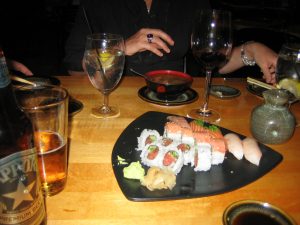 One of the downsides of working in a field where so much is beholden to the almighty billable hour is that my brain has started to re-wire itself to engage the day in terms of one-hour chunks. This model is reinforced by other phenomena in life - calendaring software like iCal and Google Calendar make it easy to parcel out the day in discrete bits of time, beeps, alarms and bells go off on the hour mark in many workplace and educational settings, and then there's the cultural convention that "all meetings take about an hour" unless otherwise noted. We're increasingly a people whose quality of life and measure of productivity has everything to do with the 24-hour clock.
One of the downsides of working in a field where so much is beholden to the almighty billable hour is that my brain has started to re-wire itself to engage the day in terms of one-hour chunks. This model is reinforced by other phenomena in life - calendaring software like iCal and Google Calendar make it easy to parcel out the day in discrete bits of time, beeps, alarms and bells go off on the hour mark in many workplace and educational settings, and then there's the cultural convention that "all meetings take about an hour" unless otherwise noted. We're increasingly a people whose quality of life and measure of productivity has everything to do with the 24-hour clock.
I generally don't mind this standard when I'm in "work mode," but I've noticed a very undesirable side effect on the rest of my life: I've been slowly losing the ability to spend open-ended social time with people, without my brain trying to fit it in to some predetermined scheduling blocks. The end result is that I think I'm less open to the wonderful, serendipitous experiences and discoveries that one can make in the comfortable and unregulated presence of friends and loved ones.
I've written before about the cues we give and get for when a conversation is going to go deeper, and when it's probably not. To answer my own question about what kinds of states of being allows you to go deeper in conversation, I've been actively working on spending more open-ended time with people I care about and want to get to know better. I have a few thoughts about how it's going, and what approaches are working:
- Scheduling fewer things in a day: Again, modern corporate scheduling culture encourages us to stack a bunch of appointments/meetings/tasks together one after the other, but that doesn't work for "quality social time." By putting fewer scheduled items in an afternoon or evening, I can be much more comfortable letting one of them go on longer than I might have expected, seeing where the time takes us. There's a "risk" that if something ends early and you have free time, there will be a sense of missed opportunity, but since I'm trying to make up for missed opportunities in the other direction (spending nurturing time with good people), I don't mind that so much.
- Clearing out mental clutter in advance: Even if I've kept my calendar open, if I go into a social setting with things weighing on my mind, items I know I'll have to work on later, etc. it's much harder to be truly present to those I'm with. As much as possible, I'm trying to find the mental and emotional space to fully engage, whether it's through actually getting those weighty tasks taken care of ahead of time, or just finding the discipline to put them away for a while.
- Paying attention to silence and pauses: Pauses and silence are often as important in a social setting as the words that are spoken. They can mean so many different things: "there's something on my mind and I could share it now if you want me to," or "I'm content here," or "I'm uncomfortable here," or "Let's talk about something else now," or "I'm done with this conversation now, how about you?" We're so bad at listening and being in silence together in this culture, but I find it worth the significant effort to try to navigate those moments, and I've been getting better about letting them come and go without needing to fill the space with my voice.
- Paying attention to body language: It's amazing how easy it is to indicate "I'm probably done with you now" via body language. A glance at the door or a clock, closing up a bag or a notebook, a yawn, shuffling keys or coins, even just changing seating position. I know that I've trained myself to do these things well at the right times in my business meetings, so now I'm training myself not to do them subconsciously in social settings. I try to sit calmly, arms and chest open, eyes and head engaged, trying to convey a sense that "I'm here with you for as long as we should be in this place together."
- Not overdoing the open-ended-ness: I still believe in finding comfortable ending points to any given interaction, so it's still important to be on the lookout for those, to achieve a kind of closure. There are also people out there who might never notice that many, many hours of a conversation have passed without a break, trip to the bathroom, sleep, etc. and I have to be careful to avoid letting their own obliviousness (said lovingly!) take up more of my time than I want to give.
The result?
 Sometimes I definitely find myself outside of my comfort zone - "gosh, I probably should have been done with this a while ago" or "hmm, I wonder if he/she is trying to go, maybe I should give them a way out!"
Sometimes I definitely find myself outside of my comfort zone - "gosh, I probably should have been done with this a while ago" or "hmm, I wonder if he/she is trying to go, maybe I should give them a way out!"
But for the most part, it's meant that I've had much more rewarding interactions with those I spend time with, and I have found some depth that I probably would have preemptively participated in squashing otherwise. I've also found myself noticing more the people who really have a hard time being in the moment themselves, sitting through pauses and silence, asking me questions and engaging me fully - these things are more apparent now that I'm not covering that up as much with my own mental preparations for the end of our time together. It's been very informative.
How do you work to make sure that you're present to the people you spend time with? What ways do you find to cultivate all that a given exchange might have to offer?
 I’m a journalist, publisher, software developer and entrepreneur with experience as a founder and organizational leader. Work with me or learn more about me.
I’m a journalist, publisher, software developer and entrepreneur with experience as a founder and organizational leader. Work with me or learn more about me.
...where did you find that delicious looking sushi???